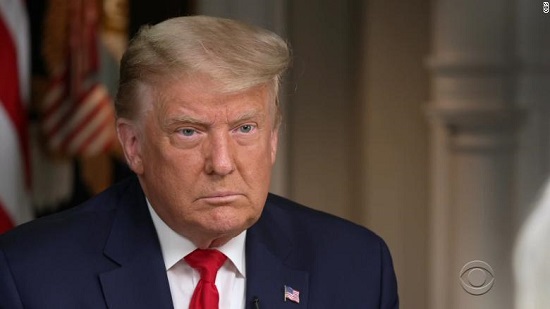There was little more than a week to go. Polls showed him losing to a man he called "the worst candidate in the history of politics." But the President had one last chance to reach a vast number of Americans with his message. What did he do with this great opportunity?
Trump s 60 Minutes tantrum told us everything
by CNN
Opinion
00:10
Tuesday ,27 October 2020

He entered whining -- and left in a huff.
In the traditional end-of-campaign interview with "60 Minutes," Donald Trump showed that his comfort zone is still his bad boy stage persona. He insulted Lesley Stahl, a mild-mannered interrogator if there ever was one, by trying to cast her as a villain. He accused her and her program of being mean to him and favoring his opponent.
"You re so negative, you re so negative," Trump groused at one point. At another, he complained, "You re really quite impossible to convince," as if he was there to make a sale instead of discussing the pandemic, the economy and his other responsibilities. Then, after 37 minutes of this, he abruptly declared "that s enough" and left.
As drama, Trump s schtick was stale to the point of pathetic. Echoing the days after his inauguration, he offered nonsense about the size of his rally crowds. He aired rabbit-hole theories about his opponent, Joe Biden. He even tried to revive a supposed scandal involving Hillary Clinton, as if summoning her name would energize his supporters.
Energizing the most rabid element of his base seemed to be Trump s only purpose and to do that he sought to pose as a warrior. "You have to fight back," he said. "And if you don t fight back, you re not sitting here very long. You go back home. You go back home to mommy." With this he sounded more like an angry boy in the schoolyard than like someone we should trust with very adult problems.
The adult on the program turned out to be Biden, who was interviewed by Norah O Donnell during the same show. Despite what Trump claimed, she did not toss Biden "softball after softball." In fact, she pressed him on his age, 78, and whether he was up to the job. She asked about the controversial question of adding more justices to the Supreme Court and how Biden would manage taxes and spending as he dealt with the economic effects of the pandemic.
In each response, Biden did sound quite like the conventional politicians whom many assume to represent a sclerotic system. But he did actually answer the questions. Asked about unfounded suggestions that he has dementia, Biden said: "Look at me. Compare our physical and mental acuity. I m happy to have that comparison." He explained his plan to raise taxes on high earners, and on expanding the Supreme Court, he promised no precipitous action but rather a commission to study the matter.
The commission idea might be a classic political dodge, but there is something reassuring about this go-slow approach to a controversy. Biden was clearly trying to turn down the heat, and after four years of red-hot rhetoric from Trump, this approach seemed less hackneyed than mature.
In the end, the difference between the Biden and Trump interviews was not the quality of the questions but the tenor of the replies. Trump established a tone of conflict, refusing to truly dialogue. And in his usual fashion he produced a string of misleading statements and out-and-out falsehoods, according to fact checkers. Biden may have dodged at times and CBS fact-checked claims that were somewhat askew. However, Biden generally engaged in the conversation, as if he respected the role of journalists who ask questions that could help voters make their choices.
"I think the contrast between Donald Trump and me is about as stark as it can get in terms of our value set and how we view the world," Biden said.
As if to prove his point, Trump s press secretary Kayleigh McEnany came into the room after Trump s interview to hand Stahl a giant, bound book. She said it was Trump s long-awaited health care plan. It was, as Stahl told viewers, nothing of the sort. It was just a pile of papers -- executive orders, legislative initiatives -- not a plan at all.
Like the crowd-size discussion, the bogus book echoed past Trump performances when he has presented stacks of blank papers and empty files that supposedly indicate he has the facts and evidence to back up his claims. This is stagecraft, not statecraft, and at this point the method only calls attention to the president s shortcomings.
The blessing in Trump s "60 Minutes" performance is that it did help make the voters choice clear. Both men are, in a sense, offering more of the same. Trump assures more drama. Biden promises a return to the steady and familiar.
One extremely well-informed observer apparently thinks that Biden s message is working. In remarks on Russian state TV Sunday about Trump s attacks on Biden and his family, Vladimir Putin appeared to come down on the former vice president s side. It was perhaps an olive branch offering that indicates that he thinks the Trump Show has entered its final act and the curtain is about to come down.


